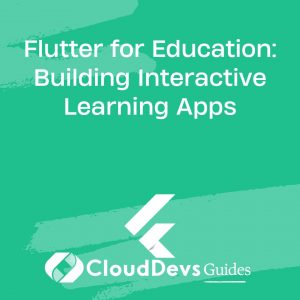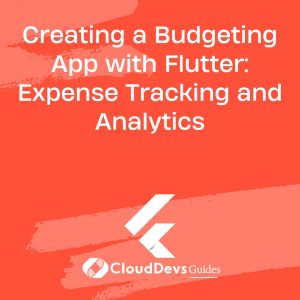Flutter for Education: Building Interactive Learning Apps
Flutter is a versatile framework for building natively compiled applications across mobile, web, and desktop from a single codebase. Its flexibility and rich set of features make it an excellent choice for developing interactive learning apps. This article explores how Flutter can be leveraged to create engaging and effective educational tools.
Understanding Flutter for Education
Flutter allows developers to create highly interactive and visually appealing apps, making it a great choice for educational applications that require a high level of user engagement. With its robust set of widgets and tools, Flutter can support a wide range of educational features, from interactive quizzes to multimedia content.
Building Interactive Learning Apps with Flutter
Flutter offers numerous features and integrations that can enhance the functionality of educational apps. Here are some key aspects and examples demonstrating how Flutter can be employed in educational app development.
1. Creating Interactive Quizzes
Interactive quizzes are a popular feature in educational apps, providing a way for users to test their knowledge and skills.
Example: Building a Quiz App with Flutter
- Set Up Your Flutter Environment
Follow the [official Flutter installation guide](https://flutter.dev/docs/get-started/install) to set up your development environment.
- Design Your Quiz Interface
Use Flutter widgets like `ListView`, `Container`, and `Button` to design an engaging quiz interface.
- Implement Quiz Logic
Write Dart code to handle quiz logic, such as tracking user answers and calculating scores.
- Add Features
Enhance your quiz app with features like timer, score summaries, and feedback.
2. Integrating Multimedia Content
Educational apps often require multimedia content like videos, images, and audio to enrich the learning experience.
Example: Incorporating Multimedia with Flutter
- Add Multimedia Libraries
Use packages like [video_player](https://pub.dev/packages/video_player) for video playback and [audioplayers](https://pub.dev/packages/audioplayers) for audio.
- Embed Media
Implement media playback features by embedding video and audio widgets in your app.
- Manage Media Assets
Store and manage media assets efficiently using Flutter’s asset management system.
3. Supporting Real-Time Collaboration
Real-time collaboration tools allow users to work together on educational tasks and projects.
Example: Building a Real-Time Collaboration Feature
- Use Firebase for Real-Time Database
Integrate Firebase with your Flutter app using the [firebase_core](https://pub.dev/packages/firebase_core) and [cloud_firestore](https://pub.dev/packages/cloud_firestore) packages.
- Implement Collaboration Features
Develop features such as shared document editing or group chat using Firebase’s real-time capabilities.
- Test Collaboration
Conduct thorough testing to ensure real-time synchronization works seamlessly.
4. Providing Personalized Learning Experiences
Personalized learning experiences adapt to the needs and progress of individual users.
Example: Creating Personalized Learning Paths
- Track User Progress
Implement user progress tracking using Flutter’s state management solutions like [Provider](https://pub.dev/packages/provider) or [Riverpod](https://pub.dev/packages/riverpod).
- Deliver Tailored Content
Develop algorithms to recommend content based on user performance and preferences.
- Gather Feedback
Incorporate feedback mechanisms to continuously refine and improve the learning experience.
Conclusion
Flutter provides a powerful and flexible platform for building interactive learning apps. By leveraging its features for quizzes, multimedia integration, real-time collaboration, and personalized learning, developers can create engaging educational tools that enhance the learning experience. With its rich set of widgets and extensive package ecosystem, Flutter stands out as a top choice for educational app development.
Further Reading:
Table of Contents









